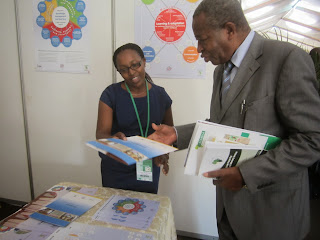By Betty Mwakelemu Tole
 |
| Uganda's Minister of Agriculture, Hon Tress Bucyanayandi tours the IFADAfrica/KMP stall. |
IFADAfrica/KMP have taken part in the symposium cluster sessions since 5 October 2013. The parallel cluster sessions have been organized around three topics: Production, Productivity and Market Access; Knowledge Systems and Business Development; and Human Capital, Natural Resources and Policies.
I attended the cluster session on Human Capital, Natural Resources and Policies, where Dr. Ajayi Oluyede, a key discussant, made comments based on Jean Mbonigaba’s presentation on Policies, Institutional Framework and International Development Interventions. Dr. Oluyede highlighted five main points from the presentation:
- Defining the real issue of concern in relation to policies, noting that Africa was not short of policies and strategies, but lacked in implementation;
- Focus on evidence based policy making, which requires good data. In communicating data to policy makers, he proposes the need to outline how it relates to national development, present the various policy scenarios or implications, and the linkages;
- The value of policy stakeholder consultation – he posed some questions such as what are the concerns of the stakeholders, what issues bother them in agriculture? To illustrate this point, he quoted an African saying “You can not shave a man’s head in his absence”;
- The need to develop case studies of success; and
- Come up with policies that embody the future of agriculture - what is the future of agriculture in the East African Community (EAC) given the advent of oil? What lessons can be drawn from similar experiences in West and Central Africa?
Ali Hersi, Regional Director, Society for International Development in East Africa, shared a presentation on Scenarios. Scenarios are useful in bringing key actors together to explore future uncertainty, and to re-think and re-organize current structures for more robust policies and strategies. He presented four socio-economic scenarios developed with policy makers, private sector, CSOs, academia and media under the Climate Change Agriculture and Food Security program based on two key drivers of change (regional integration, and mode of governance) that are highly relevant for the future of food security, environments and livelihoods in the region.